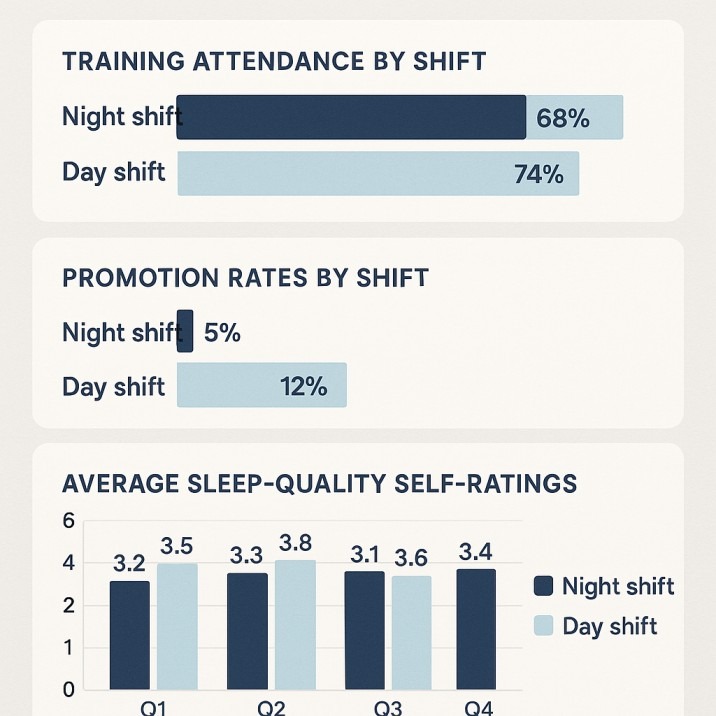Night work often looks quiet from the outside, yet the inner landscape can feel stormy. The body clocks to daylight while the job insists on darkness, and the mismatch spills into mood, focus, and connection. Understanding the psychological effects of working a night shift helps you identify what is normal, design habits that protect your mind, and advocate for a kinder schedule in a 24/7 world.
Working night shift affects mental balance by disrupting natural sleep rhythms and mood stability. Reduced sunlight impacts serotonin levels, while irregular rest increases fatigue and stress. With consistent routines, balanced nutrition, and supportive leadership, these effects can be managed and minimized effectively.
The Core Issue: Circadian Misalignment
Circadian misalignment sits at the heart of the psychological effects of working night shift. Your brain expects bright mornings, active afternoons, and restful nights; hormones like cortisol and melatonin rise and fall on that map. When the map flips, alertness drifts at 3 a.m., and a false second wind arrives just before bedtime. It is not weakness; it is biology behaving exactly as designed under unusual conditions. Awareness reframes the struggle from “what is wrong with me” to “how can I realign cues.”
Emotional Whiplash After Hours
Another early sign in the psychological effects of working night shift is emotional whiplash. During the quiet hours, people dampen feelings to stay precise and vigilant. After clock-out, stored emotion rebounds: patience shortens in traffic, small home hassles feel oversized, and social noise overwhelms. Recognizing the pattern removes shame and invites practical buffers—ten quiet minutes before the commute, a short walk after waking, and one predictable ritual that tells your nervous system it is safe to rejoin the world.
Social Jet Lag and Loneliness
Loneliness also threads through the psychological effects of working night shift because the social world runs on daylight. When friends gather while you sleep and family breakfasts happen while you are commuting, it can feel like living in a parallel city. Humans regulate stress by synchronizing with others—eating together, laughing together, running errands together. Rebuilding synchrony on nights requires deliberate planning: a standing brunch after your “morning,” a midweek video call, or a shared hobby that naturally fits your wake window.
Cognition, Memory, and Fragmented Sleep

Cognition changes under the psychological effects of working night shift, mostly because sleep after sunrise is lighter and more fragmented. The brain consolidates memory most efficiently during deep, continuous sleep; interruptions from heat, street noise, and light reduce the yield. Tasks you usually enjoy can feel dull; names and steps slip more often; confidence sags. Protecting sleep quality—blackout curtains, a cool room, eye masks, and consistent wake times—supports recall while restoring the sense that your mind is yours again.
Mood Health and Sunlight Deprivation
Mood health sits at the center of the psychological effects of working night shift. Reduced sunlight depresses serotonin pathways; fewer social anchors weaken resilience; irregular meals swing blood sugar; and chronic short sleep nudges anxiety upward. None of that means doom. It means a plan helps: get bright light in the first hour of your shift, prioritize real food before cravings lead decisions, and guard sleep like a deadline. The payback is calmer mornings, steadier evenings, and fewer surprise dips.
Culture, Recognition, and Meaning
Culture shapes the psychological effects of working night shift more than most teams realize. Night crews often hold a company together, yet their work is less visible, feedback is rarer, and career conversations happen when they are asleep. Pride needs witnesses. When recognition loops break, meaning frays, and people start to ask whether their effort matters. Managers can repair the loop with small, regular gestures: a weekly check-in scheduled for their waking hours, on-record shout-outs, and equal access to development.
Sleep Continuity Over Total Hours
Sleep continuity, not just hours, drives the psychological effects of working night shift. Four fragmented naps do not equal one solid block. Fragmentation leaves the amygdala hair-triggered and the prefrontal cortex underpowered. The result is a mind that interprets routine stress as threat, which explains why small disagreements can escalate after a string of broken sleeps. A single protected 6–8-hour window—even if it starts at 9 a.m.—is a stronger medicine than scattered dozing.
Food, Caffeine, and the Alertness Toolkit
Nutrition and stimulants can either stabilize or destabilize the psychological effects of working night shift. Caffeine is a skilled helper early in a shift but a saboteur if it sneaks into the last third. Sugary snacks provide a jolt followed by a mood trough; protein-rich, fiber-steady meals flatten that rollercoaster. Hydration matters more at night because dry air and long HVAC cycles dehydrate quietly. Think of food and fluids as part of your alertness toolkit rather than background choices.
Relationships and the “Golden Hour”
Relationships absorb a unique share of the psychological effects of working night shift. Missed dinners and overlapping sleep schedules create a pattern of near-misses. Partners may misread fatigue as disinterest; kids may feel your irregular presence as unpredictability. A few agreements can change the climate: one “golden hour” after your wake-up dedicated to connection, a predictable weekly date in your daytime, and a rule to avoid heavy conversations in the foggy hour after a shift.
Identity Splitting and Reintegration
Identity can blur within the psychological effects of working night shift. Many describe feeling like two people—competent and crisp at 2 a.m., then flat at noon among day-world rhythms. Integration starts with naming the split. Night crews often develop strong camaraderie and humor; bring a piece of that spirit home with a shared playlist, an inside joke, or a small ritual that signals continuity. The goal is not to erase differences but to stitch a bridge between the two versions of you.
Prevention Beats Rescue
Because the psychological effects of working night shift accumulate, prevention works better than rescue. Light becomes medicine: a 20–30-minute dose of bright light at the start of the shift delays the clock just enough; blackout curtains and cool air help seal daytime sleep. Movement is timing, not intensity: a moderate workout after waking sharpens focus without sabotaging bedtime. Social scheduling acts like scaffolding, replacing accidental isolation with planned connection that the week can trust.
Burnout in Night Colors
Burnout wears a night-colored coat in the psychological effects of working night shift. It shows up as cynicism, creeping numbness, and a quieter ambition; people say “I’m fine, just tired,” for months. By the time they feel “really burned out,” energy debt is deep. The counter-move is to treat recovery as a core task, not an optional reward. That may look like declining back-to-back rotations, taking micro-breaks at circadian valleys, and honoring days off as true off-time rather than a chore sprint.
Smarter Rotations and Task Timing
Work design can soften the psychological effects of working night shift. Rotations that flip every two or three days produce a form of permanent jet lag; longer blocks with consistent start times let clocks settle. Placing complex, high-risk tasks in the first half of a shift and saving routine work for the circadian low reduces errors and preserves confidence. Physical space helps too—cooler light in task zones, warmer light in break areas, and stable noise levels that protect calm.
Leadership, Safety, and Time Equity
Leadership sets the tone for the psychological effects of working night shift. Psychological safety should include fatigue honesty: people need to say, “I am not sharp right now,” without fear of stigma. Equity should include time equity: training, mentorship, and promotion paths must be available at hours night crews can attend live. Wellbeing metrics should be collected by shift, not averaged away; what gets measured at night finally gets managed at night.

Adaptation and Hope
Hope is the most underrated part of the psychological effects of working night shift. The brain adapts when cues are consistent. People who pair strategic light, stable sleep, smart nutrition, and intentional social time often report that nights become not just survivable, but sustainable. Pride returns. Humor returns. And purpose—the reason you took the role—returns too. The difference rarely comes from one heroic hack; it comes from stacking small, repeatable choices that honor your biology.
A Starting Plan You Can Trust
New to nights? Start by naming the psychological effects of working night shift so you can recognize them without panic. Veterans can try a fresh experiment—tune one variable per week (light timing, meal timing, or wake time) until energy feels steadier. Leaders, meanwhile, should build systems that respect body clocks as much as timesheets. Night work will always be different, but with the right design, it does not have to be damaging.
Conclusion
Night work will always bend the clock, but it doesn’t have to break your mind. When you understand the psychological effects of working night shift, you can turn biology into a blueprint: anchor light at the start of your shift, protect a solid block of sleep, fuel steadily, and schedule connection on purpose rather than leaving it to chance. Over time, those small, repeatable choices rebuild focus, stabilize mood, and soften the social jet lag that makes nights feel isolating. If you lead a team, design the system to fit the human—recognition in their waking hours, training they can actually attend, tasks timed to natural alertness, and permission to speak honestly about fatigue. With thoughtful routines and supportive culture, the psychological effects of working night shift become manageable constraints rather than inevitable harm. You may still live on a different timetable, but you can carry the same clarity, pride, and purpose—at 2 a.m. and at noon.
Andrea Balint is a writer and researcher focused on human behavior, workplace psychology, and personal growth. Through her work at CareersMomentum, she explores how mindset, leadership, and emotional intelligence shape modern careers. With a background in communication and HR development, she transforms complex ideas into practical insights that help readers build clarity, confidence, and professional purpose.
